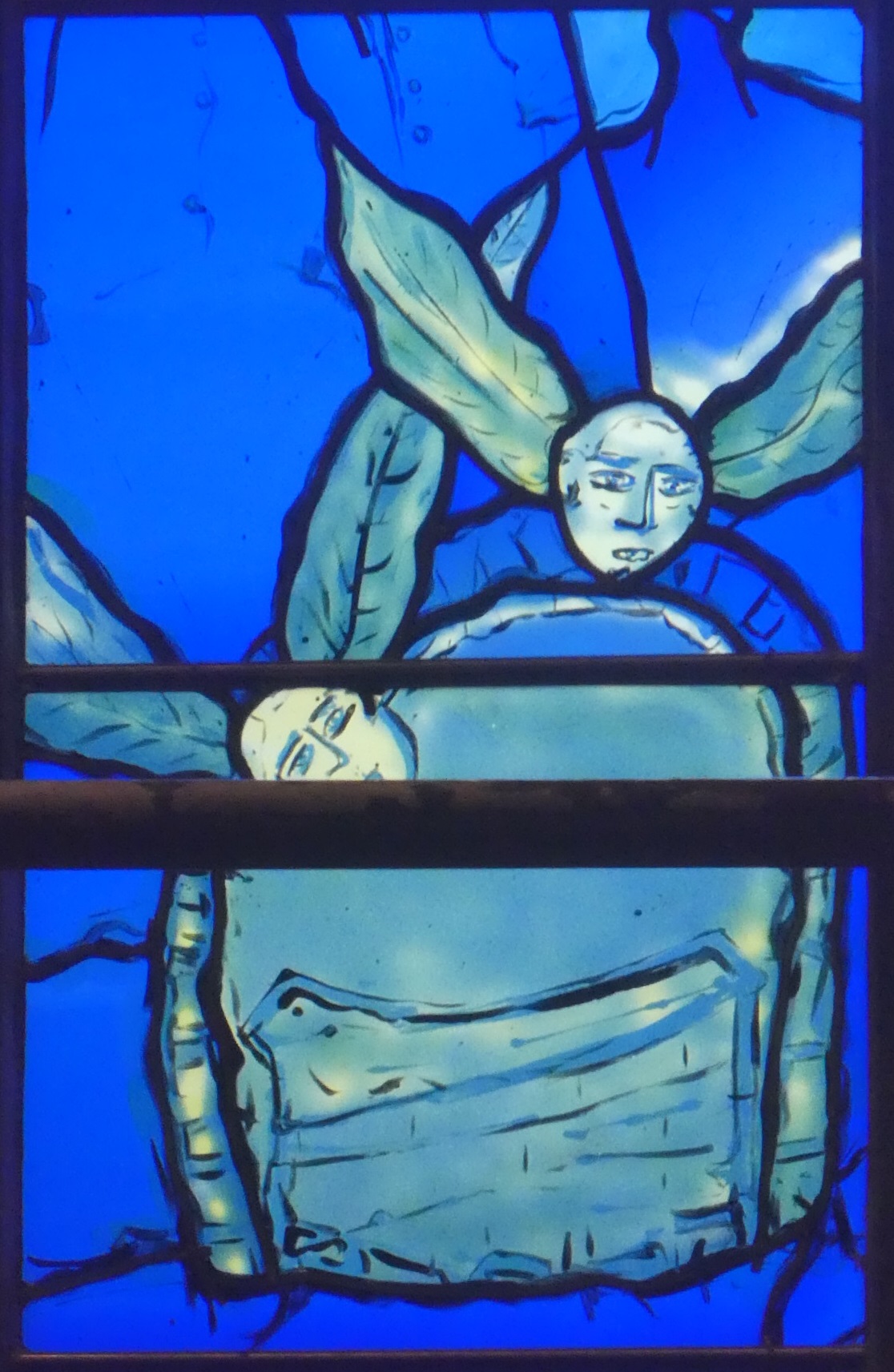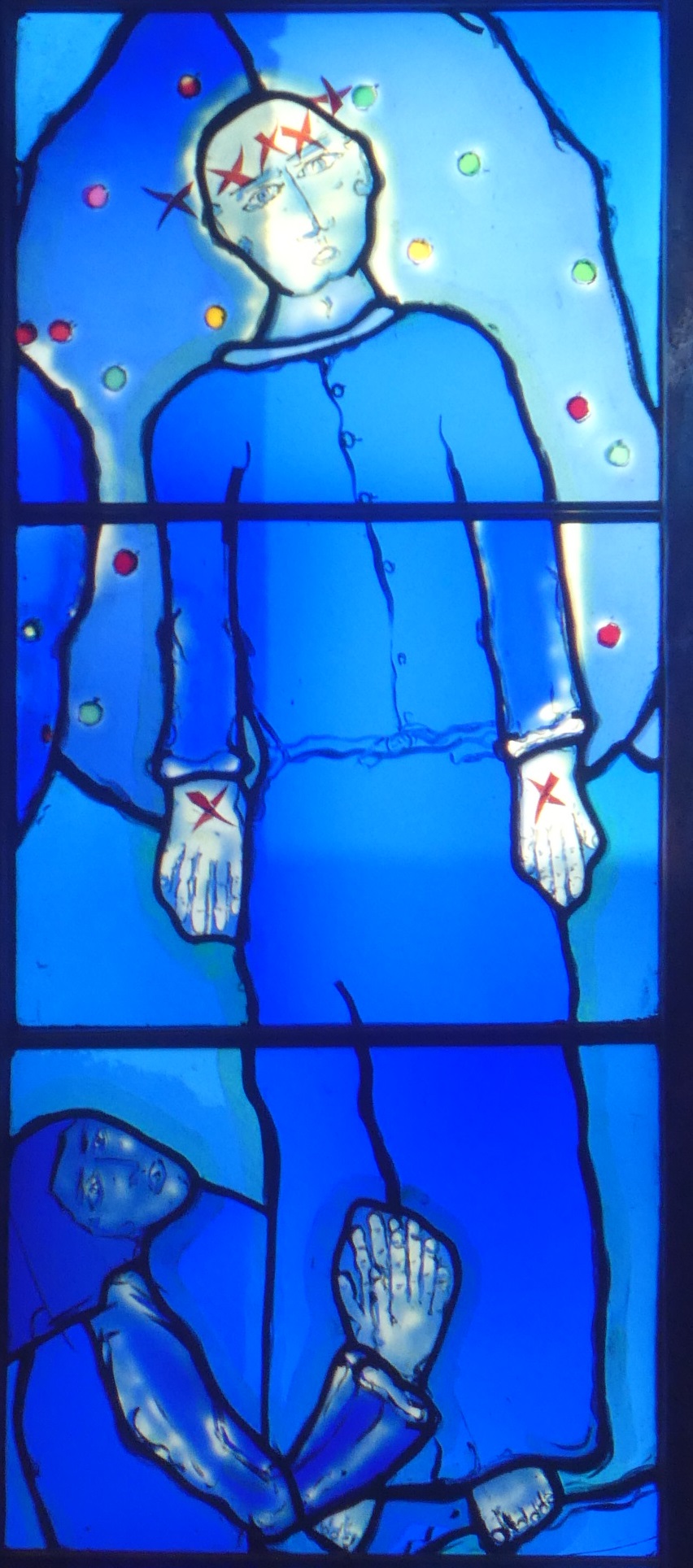The Bible readings
Acts 17.22-31
Then Paul stood in front of the Areopagus and said, ‘Athenians, I see how extremely religious you are in every way. For as I went through the city and looked carefully at the objects of your worship, I found among them an altar with the inscription, “To an unknown god.” What therefore you worship as unknown, this I proclaim to you. The God who made the world and everything in it, he who is Lord of heaven and earth, does not live in shrines made by human hands, nor is he served by human hands, as though he needed anything, since he himself gives to all mortals life and breath and all things. From one ancestor he made all nations to inhabit the whole earth, and he allotted the times of their existence and the boundaries of the places where they would live, so that they would search for God and perhaps grope for him and find him—though indeed he is not far from each one of us. For “In him we live and move and have our being”; as even some of your own poets have said,
“For we too are his offspring.”
Since we are God’s offspring, we ought not to think that the deity is like gold, or silver, or stone, an image formed by the art and imagination of mortals. While God has overlooked the times of human ignorance, now he commands all people everywhere to repent, because he has fixed a day on which he will have the world judged in righteousness by a man whom he has appointed, and of this he has given assurance to all by raising him from the dead.’
John 14.15-21
Jesus said 'If you love me, you will keep my commandments. And I will ask the Father, and he will give you another Advocate, to be with you for ever. This is the Spirit of truth, whom the world cannot receive, because it neither sees him nor knows him. You know him, because he abides with you, and he will be in you.
‘I will not leave you orphaned; I am coming to you. In a little while the world will no longer see me, but you will see me; because I live, you also will live. On that day you will know that I am in my Father, and you in me, and I in you. They who have my commandments and keep them are those who love me; and those who love me will be loved by my Father, and I will love them and reveal myself to them.’
The Sermon
By Joe, a Lay Reader at St Mary's.
May I speak in the name of the Father, Son and the Holy Spirit – Amen.
And as we’re still in lockdown, get your favourite beverage and make yourself comfy…
Back in the days when this country had fairly strict obscenity laws, a judge reputedly made the comment that whilst he couldn’t necessarily define pornography, he knew it when he saw it.
And I think that we Christians sometimes have similar thoughts about two words that we all use, often without too much thought; Gospel and Evangelism.
Now, for many years when I heard the word ‘Evangelism’ my mind was transported to a sweaty tent in the Bible Belt of the USA, where a flashy looking chap would be preaching up a storm whilst passing a bucket around for contributions…not terribly helpful, I know, and not what I think now. But old thought patterns persist, so I want to start by putting a couple of ‘working definitions’ on the table.
“The word gospel comes from the Old English god meaning "good" and spel meaning "news, a story." In Christianity, the term "good news" refers to the story of Jesus Christ's birth, death, and resurrection.”
“In Christianity, evangelism is the commitment to or act of publicly preaching (ministry) of the Gospel with the intention to share the message and teachings of Jesus Christ.”
Having got that out of the way – you’ll see why later – let’s take a look at the reading from the book of Acts, in which Paul finds himself speaking to the Athenian ruling council – the Areopagus – and shares with them some thoughts on God.
For once, Paul is not in front of the local authorities having breached local laws. He’s in Athens awaiting the arrival of Silas and Timothy, spending time whilst the situation in Thessalonica and Berea calms down. Earlier in Chapter 17 we read how Paul had been in both those places and had been received as an agitator and a general nuisance. In Athens, the locals have invited him before the ruling council so that they can hear the new ideas that Paul has to offer. Athens is something of an intellectual hotbed, and the people are at least willing to hear Paul out.
Now Paul’s not here to preach; but given the opportunity he’s not one to turn down any opportunity to evangelise and spread the Gospel. See? I told you those definitions would come in useful! But how will he tackle this opportunity?
Taking an audience-appropriate approach to evangelism is essential, and Paul knows this. He’s seen how religious the Athenians are, and he knows they are proud of their cultural heritage. This is not a place where sermons that work in Judea or Israel will work, and Paul knows that. And there is a really big difference between the religious beliefs of the pagans – the Greeks and Romans – and the Jewish people. They are polytheists – they believe in multiple gods, each god or goddess being worshipped for different reasons and in different ways, unlike the monotheistic God of the Jews and Christians.
Paul has clearly been around the city. He remarks how he came across an altar intended for the worship of an unknown god. He then tells the Athenians that it is this ‘unknown god’ of which he will speak:
“The God who made the world and everything in it, he who is Lord of heaven and earth, does not live in shrines made by human hands, nor is he served by human hands, as though he needed anything, since he himself gives to all mortals life and breath and all things. From one ancestor he made all nations to inhabit the whole earth, and he allotted the times of their existence and the boundaries of the places where they would live, so that they would search for God and perhaps grope for him and find him—though indeed he is not far from each one of us”
And in doing so gives a very brief summary of the Jewish / Christian belief that the listeners would find little to object to. He even backs up his words by quoting a couple of Greek poets in support of his statement.
So – a first piece of guidance for all preachers and evangelists. When you are in a new place, with new people, know your audience. Look around, find out about their beliefs and their culture. Bring in whatever areas of commonality you can find, build the bridges to make it easier for your audience to listen to you. Don’t mis-represent your beliefs or the beliefs of your audience; look for the points of similarity to allow you to build up a sense of discussion and dialogue, not one of confrontation.
In Verse 29 Paul makes a comment that might be provocative to some of his audience; he makes comments about idolatry – God is not “an image formed by the art and imagination of mortals”. Interestingly enough, the temples and sacred spaces dedicated to most of the gods have statues and images that are objects of worship and veneration. But the ‘altar to an unknown god’ probably has nothing like that; after all – if it’s unknown, by definition it would be hard to create an image of that god.
It would have been interesting to have been a member of the audience at this stage; how would they be reacting? It’s likely that the audience wouldn’t have had too much to grumble about with these comments. The Greeks had a respect for their gods, after all.
So far, Paul has been an engaging speaker; he’s explored a few new ideas, but he has not been an evangelist. A second thing to remember for all of us preachers; we’re preaching and ministering to bring the Gospel to people, not impress folks with our rhetorical skills.
Back to those definitions; Paul has spoken of God, but he has not spoken of the Gospel – the story of Jesus Christ’s birth, death, and – most importantly – resurrection.
Paul has taken his audience with him in ways that respect their beliefs, that place God in a context that they can understand – at least intellectually. But in Verse 30 he takes things to a place that many of his audience might find uncomfortable.
God has “ fixed a day on which he will have the world judged in righteousness by a man whom he has appointed, and of this he has given assurance to all by raising him from the dead.”
Paul has finally hit the core message of the Gospel – still without mentioning Jesus’s name – but he talks of the resurrection from the dead of a man, who will be judge.
The part that would freak out the Greeks would be talk of resurrection of the body. Greek beliefs had a place for the immortal soul, but not for raising bodies from the dead. Paul has taken his audience to the core of the Gospel story, and, he will lose some of them.
In the next verse after tonight’s reading, we hear:
“When they heard about the resurrection of the dead, some of them sneered, but others said, “We want to hear you again on this subject.” At that, Paul left the Council. Some of the people became followers of Paul and believed.”
A final lesson for preachers; it is at the point where you bring the core message of the Gospel to people – the story of the birth, death and resurrection of Jesus Christ – that you may lose some of your audience; and it is at that moment that you are truly an evangelist. You are bringing the Gospel message to the people, and the people must choose whether they wish to follow Christ.
The role of the evangelist is not to brow-beat or convert; it is to lay the Gospel – honestly, fully - before the people so that, God willing, they may choose the path of Christ for themselves.
Amen.
The prayers
Written by Catherine:
God of the whole world,
we give thanks that you are not unknown,
but make yourself known to all who seek you.
Draw close to all seeking you anew,
or seeking you for the first time
in this time of crisis.
Guide your worldwide church
so that we may show your love for all.
Loving God…
Help us to be loving too.
God of all nations
we pray for your world and all people
as we continue to face this pandemic together.
Guide the leaders of the nations
that they may act
with wisdom and compassion
so that the vulnerable are protected,
resources shared equitably
and all may thrive.
Loving God…
Help us to be loving too.
God of love and truth
we pray for our own nation:
for people anxious or confused
by what this week’s changes to regulations do or do not permit,
for workplaces trying to adapt
to keep colleagues safe,
for those worried about returning to work.
We continue to pray for all
who still cannot leave home
or meet friends or relatives,
and give continued thanks
for the work of volunteers
and mutual aid groups.
Loving God…
Help us to be loving too.
Healing God
we pray for all who are unwell
or troubled in any way.
We continue to pray for those suffering from Covid-19
or any other illness.
We pray for all who work
in the health and caring professions
and for those who support them,
We remember all families
distressed because they can’t visit a loved one in hospital.
We think of anyone known personally to us
who is ill
or in particular need….
Loving God…
Help us to be loving too.
God of the dying and the bereaved
we give thanks
for your promise not to leave us orphaned.
We pray for those who have died
or lost loved ones this week:
for the victims of the maternity hospital massacre in Afghanistan
for those who died due to Covid-19
for all who died alone.
We ask that you be especially close
to all who mourn.
May they know your love.
We think of anyone known personally to us
who has died recently….
Loving God…
Help us to be loving too.
The post-communion prayer for this Sunday, the 6th Sunday of Easter:
God our Father,
whose Son Jesus Christ gives the water of eternal life:
may we thirst for you,
the spring of life and source of goodness,
through him who is alive and reigns, now and for ever
Amen.
Post-communion prayer © Archbishops’ Council 2000




